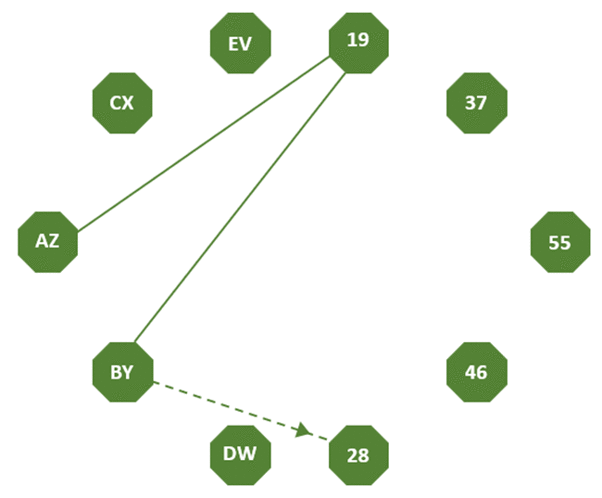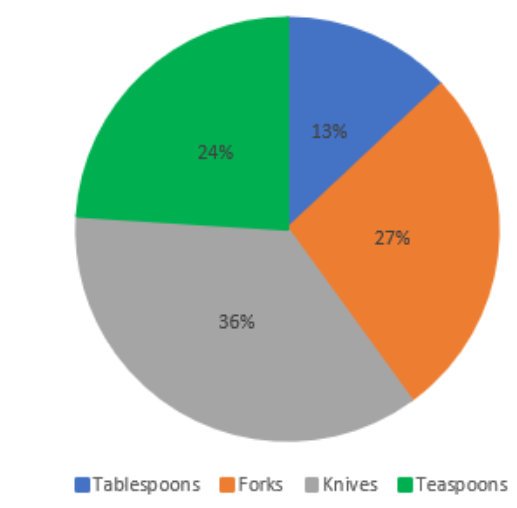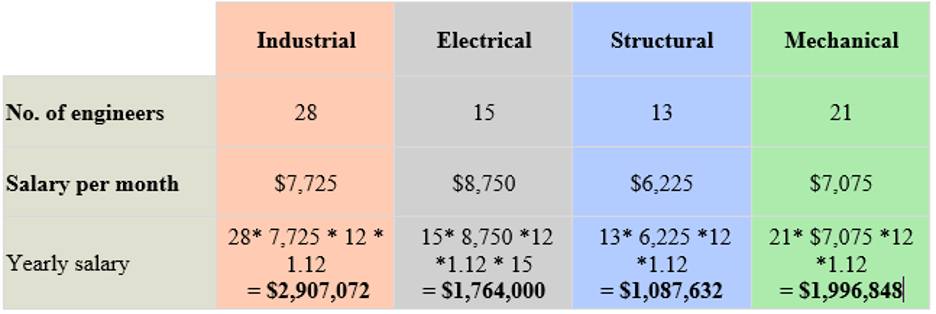The SHL General Ability Test (also known as Verify G+) is a challenging cognitive assessment that combines three topics: numerical reasoning, inductive reasoning, and deductive reasoning.
On this page, we provide an SHL Verify G+ practice test, complete with sample questions and solutions, along with a comprehensive test guide to ensure you know what to expect.
What Is the SHL General Ability Test?
The SHL General Ability Test (Verify G+) contains 24-30 cognitive questions (depending on the version) and takes 36 minutes to complete. It is SHL’s most popular test used to assess your thinking and problem-solving abilities.
The test covers three topics, each containing several question types:
| Numerical Reasoning | 8-10 questions |
| Inductive Reasoning | 8-10 questions |
| Deductive Reasoning | 8-10 questions |
Within the test, the topics of the questions will be mixed.
This means a numerical reasoning test question could be immediately followed by a deductive reasoning test question.
This means the SHL Verify doesn't just measure your numerical and logical aptitude; it also assesses your task shifting, that is, your ability to switch between different cognitive assessments and domains easily.
What Type of Questions Can You Expect on Your Verify G+ Test?
The SHL General Ability cognitive aptitude test comes in two versions: interactive and multiple-choice. To make the most out of your preparation time, make sure you practice the correct version, as the two versions differ in their format.
SHL Verify G+
The older test version, this test format contains up to 20 questions to be answered in 36 minutes (plus ten or so minutes for reading instructions).
The SHL Verify G+ contains multiple-choice questions, as most traditional cognitive assessments do.
SHL Verify Interactive Test
This is the newer, and much more ubiquitous version of the SHL Verify Assessment. It is planned to replace the older Verify G+ eventually. The interactive test is still 36 minutes long, but with 24 questions.
The SHL Verify Interactive G+ also differs in its adaptability and mobile-first approach:
It includes interactive, open-ended questions, which means you can take the test on your mobile phone and interact with it (e.g., drag-and-drop, connect the dots). Furthermore, this version of the test is adaptive; as the test progresses, the difficulty level increases with each correct answer.
You can take our general-purpose Free SHL Assessment Test and practice SHL-style questions!
Which Companies Use the SHL General Ability?
Many different companies and organizations use the General Ability Test to measure cognitive ability in candidates, as it is among the most common pre-employment psychometric tests.
These include Deutsche Bank, PwC, and Dish Network.
NOTE: To ensure you are about to take the SHL General Ability test, check the name in your test invitation.
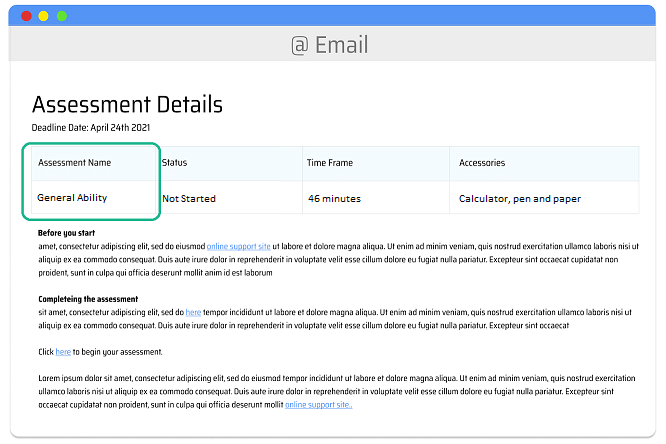
SHL Verify G+ Practice Test Questions
All the practice questions below are taken from our complete SHL Verify G+ Preparation Pack, designed to accurately mirror the exam and its format. It includes:
- SHL Verify G+ Interactive & Multiple-Choice Test Simulations- Experience the exact format, time limit, and questions found in any version of the SHL General Ability Test. This will enable you to overcome the specific challenges associated with each version.
- Numerical, Deductive, and Inductive Verify G+ practice tests - Identify and focus on your weaker areas within each domain, helping you improve your skills and maximize your score.
- Study guides, complete score reports, and solving tips - Get step-by-step explanations, strategies, and tips for each question, empowering you to solve questions more efficiently and achieve a higher score.
Numerical Reasoning
SHL Numerical reasoning questions typically focus on your ability to extract, calculate, and come to conclusions based on numerical data. Here is an example of a numerical reasoning question you might see on the SHL Verify G+ test:
Numerical Reasoning Sample Question
What proportion of both sites' April and May traffic was for Cuisine.net?
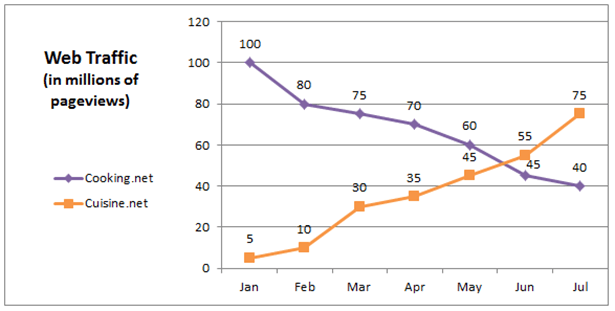
Did you know - there is also an SHL Calculation Test dedicated only to mental calculations.
Learn more about numerical reasoning tests.
Inductive Reasoning
The assessment includes 2 types of logical reasoning questions: Inductive reasoning and deductive reasoning. Both aim to ascertain your ability to reach correct logical conclusions. Let's begin with inductive questions:
SHL Inductive questions revolve around finding the logical rules represented in shapes’ color, position, etc. The following is an example of a typical SHL Verify G+ question:
Inductive Reasoning Sample Question
Which diagram would appear next in series?
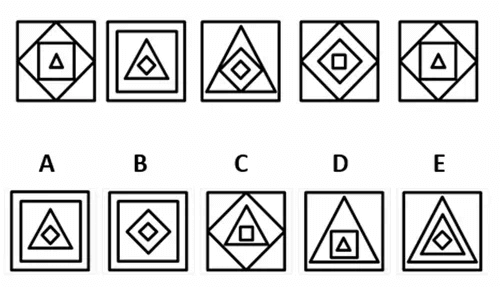
Deductive Reasoning
SHL Deductive questions examine your ability to draw logical conclusions out of given information. This will usually be measured by scheduling tasks or ranking items based on constraints. Here is an example of such a question:
SHL Deductive Sample Question
In a restaurant's storage room, there are seven kinds of fruits - Figs, Guavas, Honeydews, Kiwis, Mangos, Nectarines and Papayas. The restaurant's chef has to pick exactly four different kinds of fruits out of the seven to make a fruit salad. The selected fruits must meet the following conditions:
- Papaya can be selected only if Kiwi is selected.
- Fig can be selected only if Nectarine is selected.
- Either Mango or Nectarine must be selected but not both.
- Either Papaya or Honeydew must be selected but not both.
Which one of the following could be a complete and accurate list of the fruits from which the salad is made up?
More questions, full simulations and Verify G+ practice tests are available in our complete SHL General Ability Preparation Pack.
Customer Testimonials
SHL Verify Interactive G+ Practice Questions
As mentioned, interactive verify g+ questions involve similar skills as the non-interactive questions, only they require to insert your answer by interacting with visual elements, which in some cases makes the question more complex.
For example, try the following inductive question simulating Verify G+ interactive questions, taken from our complete SHL Verify G+ Preparation:
Inductive Question- Complete the following sequence:
In the actual test, you'll have to click on the nodes to connect them, according to the appropriate sequence.
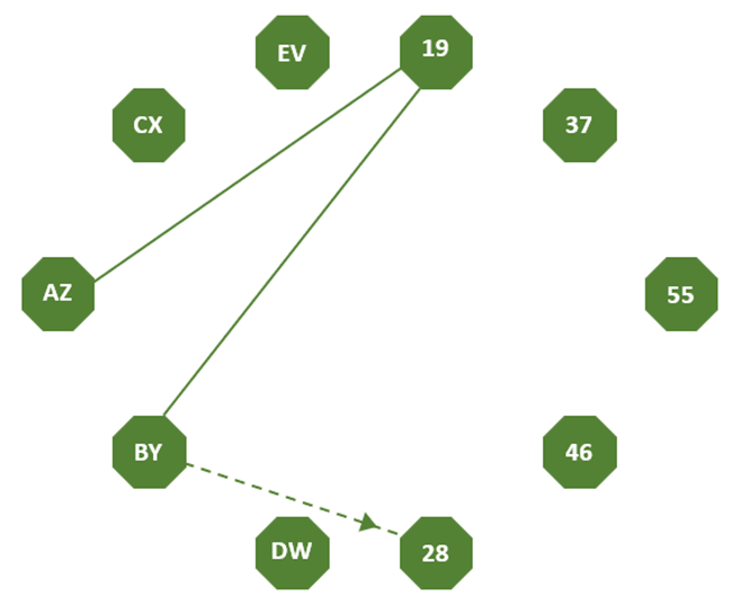
Interactive questions are also more challenging because they are open-ended. It's especially challenging in numerical questions, which in other cases can be answered by eliminating answers and using shortcuts.
For example, try the following interactive numerical question:
Numerical question- Chart Pie
There are 77 engineers from four fields working in your high-tech company and they are paid a 12% annual bonus on their annual salary.
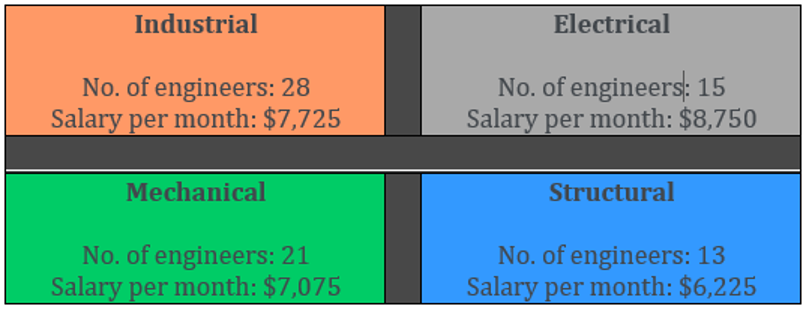
Determine the annual salary (including bonus) paid to each engineering field in percentages (rounding to the nearest whole number only in the last step).
In the actual test, you will be presented with a chart pie which you will have to divide according to the correct percentages.
On the actual test, you will have approximately 2 minutes for each question.
Other interactive questions will require you to recognize roles and patterns represented in the shapes (deductive), create work schedules based on provided constraints (inductive), understand and create graphs (numerical), and much more. All possible interactive question types, mirroring the actual SHL Verify g+ test format, are available in our SHL General Ability Preparation Pack.
Haven't found the questions you are looking for? Visit our free SHL practice test for sample questions of common SHL tests.
SHL General Ability Scoring
Here are some frequent questions about the SHL General Ability Test score:
What Is a Good Score on the SHL General Ability Test?
As a general rule, you need to score at least at the 80th percentile (a score higher than at least 80% of the comparison group) to pass the assessment.
What is a comparison group?
Your comparison group is a group of candidates previously tested by SHL, whose profile is similar to the job you applied to.
SHL’s 4 most common comparison groups are:
- Operational
- Graduates
- Supervisors
- Managers
So eventually, a passing score on the SHL General Ability Test depends on the position you apply to.
Will I Be Able to View My Score After the Test?
Not always.
Sometimes you will receive a detailed score report, showing you your exact percentile score in each section, as this detailed SHL score report.
Yet, sometimes you will only get your performance grade relative to your comparison group:

In any case, you will not be able to see how well you have answered individual questions.
For How Long Is My SHL Score Valid?
This depends on the hiring company, yet according to their score reports, SHL saves your scores for 12-18 months.
Practicing the SHL General Ability Test
You will usually have no more than 1 week to prepare for the SHL General Ability Test. Therefore, to be best prepared, your practice must be focused and accurate.
Follow these 4 crucial guidelines:
#1 – Prepare for the Right Test
As I’ve mentioned (more than once…), the SHL General Ability Test has two versions. If you practice the wrong one, your score will be less than optimal.
Do your best to find out exactly which version you’re taking.
#2 – Practice In-Depth and In Breadth
What does that mean, anyway?
- Practice In-Depth – Solve many questions of the same type consecutively. This will highly increase your skill and solving speed in the specific style of SHL questions.
- Practice In Breadth – Solve simulations of the actual Verify G+ test, where questions are mixed. This will improve your flexibility and adaptability for different question types.
#3 – Practice What Matters
Don’t waste your time on question types that won’t appear on the actual assessment.
Research shows that to significantly improve your score on cognitive tests, you should solve questions as close as possible to those on the actual test, in terms of both content AND structure.
It is true that practicing questions that are only related to the ones on the real test may be helpful as well – but their effect on your score is FAR lower.
Focus first and foremost on SHL-type questions, and if you have some time left, practice additional types.
#4 – Learn from Your Mistakes
To improve, you must know where you went wrong.
That is primarily why it isn't recommended to rely on SHL’s official practice tests. Yes, they will give you a good understanding of what the test looks like, but they have no answers and no explanations, so your ability to learn and improve is limited.
In addition, remember that the SHL General Ability Test combines three different topics (numerical, inductive, and deductive). Therefore, it is essential that you know in which of these areas you are weakest, so your final score is as high as it can be.
More SHL Tests
SHL Group Limited is a leading industry giant in the fields of psychometric assessments, aptitude tests, and personality assessments, with a primary focus on pre-employment assessments. Their clients include some instantly recognizable names such as Capital One, Barclays, Home Depot, and others.
The General Ability, also known as Verify G+, is SHL's hallmark cognitive ability assessment, combining three of their largest products by including numerical reasoning questions, inductive reasoning questions, and deductive reasoning questions.
Other common SHL assessments not included in the Verify G+ are the SHL Verbal Reasoning Test, SHL Calculation Test, SHL Checking Test, and SHL Mechanical Comprehension Test.
SHL also distributes pre-employment personality and motivation assessments, such as the Occupational Personality Questionnaire and Motivational Questionnaire.
SHL test results are unique in that they are graded against a norm group, rather than based on absolute performance, i.e. the number of questions answered correctly.
SHL TalentCentral
TalentCentral (or Talent Central) is SHL’s testing platform – the website on which you will take your SHL Verify G+ test.
Since all of SHL’s tests are conducted on the TalentCentral platform, that name alone will unfortunately not help you to determine which SHL test you take.
Frequently Asked Questions
The SHL Verify G+ test is considered a difficult assessment. Unlike other aptitude tests, the questions on SHL assessments are designed to have high item discrimination. This means each and every question efficiently distinguishes between weak and strong candidates. There are no easy questions to help you slide into the test comfortably.
To pass the General Ability Test, brush up on your numerical reasoning, deductive reasoning, and inductive reasoning.
These are cognitive abilities that most people have earned while studying in school. Still, the difference between success and failure can rest upon how recently the candidate has practiced them and how easily they can call them up and utilize them to answer questions.
Not quite. Most countries have discrimination laws prohibiting IQ assessments as a screening test for a company's hiring process. The Verify G+ Test does, however, cover many of the same competencies as classic IQ tests like the Wechsler Adult Intelligence Test. It simply places a larger focus on skills that predict good job performance.
Yes. The SHL Occupational Personality Questionnaire assesses the candidate's personality traits and is often paired with the General Ability Test.
Failing typically means being withdrawn from consideration for the role. However, this does not mean you have to give up hope. Many companies offer second chances. While most don't provide feedback, you can sometimes obtain your score report by filing a freedom of information request, which can help you identify areas for improvement.
The best approach, however, is to come prepared the first time. This can be achieved by using practice tests before the real assessment and ensuring you receive any accommodations you are entitled to.
Start Preparing for Your SHL General Ability Test
- Practice for the Right Test - This is the ONLY preparation resource that prepares you for both the Verify Interactive G+ test and Verify G+ multiple-choice test versions.
- In-Depth and In-Breadth Practice - Full-length simulations of the SHL General Ability Test, as well as an abundance of additional verify g+ practice tests for any skill and topic on the test.
- Practice What Matters - Question types similar to those on the real SHL General Ability Test.
- Learn from Your Mistakes - Detailed explanations to all questions.


